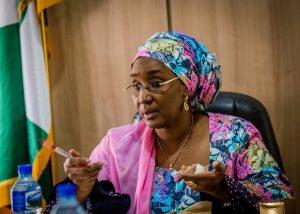
The federal government of Nigeria has confirmed the appointment of 5000 independent monitors to oversee the disbursement of funds to beneficiaries under the National Social Investment Programme (NSIP).
This development was confirmed to newsmen in Lagos on Thursday by the Minister of Humanitarian Affairs, Disaster Management and Social Development, Sadiya Umar Farouq.
Represented by the Assistant Director, Research and Statistics in the Ministry, Mrs. Jumai Ali, the Minister said the 5000 independent monitors have been assigned to monitor programme beneficiaries within their schools, households and market clusters with the focus of ensuring that the primary objectives of the programmes were achieved.
Naija News understands the monitors have commenced a two-week training programme which is expected to better equip them for the task of monitoring and verifying disbursements under the NSIP programmes which usually run into several billions of naira.
The administration of President Muhammadu Buhari established the National Social Investments Programmes (NSIP) in 2016, to tackle poverty and hunger across the country.
The suite of programmes under the NSIP focuses on ensuring a more equitable distribution of resources to vulnerable populations, including children, youth and women.
Apart from the flagship Npower programme, other programmes undr the scheme include the National Home Grown School Feeding Programme (NHGSFP), Conditional Cash Transfer Programme (CCT), the Government Enterprise and Empowerment Programme (GEEP), Tradermoni, Marketmoni, Farmermoni, special grant transfer, public workfare and skills for jobs.
Ali also added on Thursday that the government will be working with the Economic and Financial Crime Commission (EFFC), Independent Corrupt Practices and Other Related Offences Commission (ICPC) and security agencies to check monitors who may want to engage in malpractices.
Meanwhile, Nigeria’s economy unexpectedly exited recession in the fourth quarter of 2020.
In a statement on Thursday, the National Bureau of Statistics (NBS) said the economy grew by 0.11 percent.
The development comes after two consecutive quarters of negative growth which resulted in a recession.


